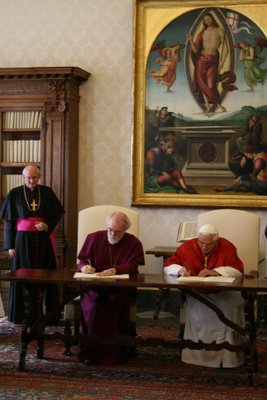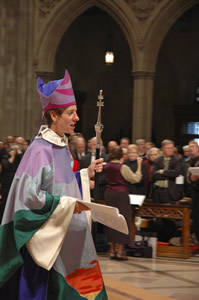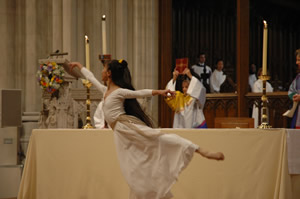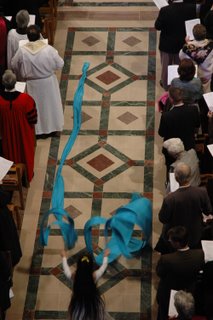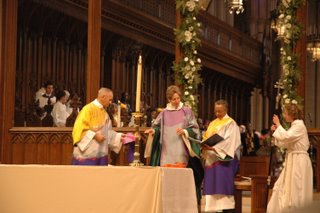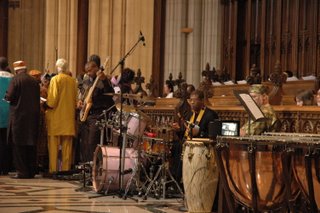
When Pope Benedict XVI attended the Divine Liturgy celebrated by the Patriarch of Constantinople, Bartholomew I, yesterday the patriarch's homily struck several positive notes about the prospect for restored "full communion" between Rome and the Eastern Orthodox Churches. This is a portion of the homily, with boldfaced highlights by me.
The entire text may be found here.
we recognize that the rule of prayer is the rule of faith (lex orandi lex credendi), that the doctrines of the Person of Christ and of the Holy Trinity have left an indelible mark on the liturgy, which comprises one of the undefined doctrines, "revealed to us in mystery," of which St. Basil the Great so eloquently spoke. This is why, in liturgy, we are reminded of the need to reach unity in faith as well as in prayer. Therefore, we kneel in humility and repentance before the living God and our Lord Jesus Christ, whose precious Name we bear and yet at the same time whose seamless garment we have divided. We confess in sorrow that we are not yet able to celebrate the holy sacraments in unity. And we pray that the day may come when this sacramental unity will be realized in its fullness.
And yet, Your Holiness and beloved brother in Christ, this con-celebration of heaven and earth, of history and time, brings us closer to each other today through the blessing of the presence, together with all the saints, of the predecessors of our Modesty, namely St. Gregory the Theologian and St. John Chrysostom. We are honored to venerate the relics of these two spiritual giants after the solemn restoration of their sacred relics in this holy church two years ago when they were graciously returned to us by the venerable Pope John Paul II. Just as, at that time, during our Thronal Feast, we welcomed and placed their saintly relics on the Patriarchal Throne, chanting "Behold your throne!", so today we gather in their living presence and eternal memory as we celebrate the Liturgy named in honor of St. John Chrysostom.
Thus our worship coincides with the same joyous worship in heaven and throughout history. Indeed, as St. John Chrysostom himself affirms: "Those in heaven and those on earth form a single festival, a shared thanksgiving, one choir" (PG 56.97). Heaven and earth offer one prayer, one feast, one doxology. The Divine Liturgy is at once the heavenly kingdom and our home, "a new heaven and a new earth" (Rev. 21.1), the ground and center where all things find their true meaning. The Liturgy teaches us to broaden our horizon and vision, to speak the language of love and communion, but also to learn that we must be with one another in spite of our differences and even divisions. In its spacious embrace, it includes the whole world, the communion of saints, and all of God's creation. The entire universe becomes "a cosmic liturgy", to recall the teaching of St. Maximus the Confessor. This kind of Liturgy can never grow old or outdated.
The only appropriate response to this showering of divine benefits and compassionate mercy is gratitude (eucharistia). Indeed, thanksgiving and glory are the only fitting response of human beings to their Creator. For to Him belong all glory, honor, and worship: Father, Son, and Holy Spirit; now and always, and to the ages of ages. Amen.
Truly, particular and wholehearted gratitude fills our hearts toward the loving God, for today, on the festive commemoration of the Apostle founder and protector of this Church, the Divine Liturgy is attended by His Holiness our brother and bishop of the elder Rome, Pope Benedict XVI, together with his honorable entourage. Once again, we gratefully greet this presence as a blessing from God, as an expression of brotherly love and honor toward our Church, and as evidence of our common desire to continue – in a spirit of love and faithfulness to the Gospel Truth and the common tradition of our Fathers – the unwavering journey toward the restoration of full communion among our Churches, which constitutes His divine will and command. May it be so.
Pope Benedict's comments in response (with boldface emphasis added) may be found here.
In that same spirit, my presence here today is meant to renew our commitment to advancing along the road towards the re-establishment – by God’s grace – of full communion between the Church of Rome and the Church of Constantinople. I can assure you that the Catholic Church is willing to do everything possible to overcome obstacles and to seek, together with our Orthodox brothers and sisters, ever more effective means of pastoral cooperation to this end.
...
Our efforts to build closer ties between the Catholic Church and the Orthodox Churches are a part of this missionary task. The divisions which exist among Christians are a scandal to the world and an obstacle to the proclamation of the Gospel. On the eve of his passion and death, the Lord, surrounded by his disciples, prayed fervently that all may be one, so that the world may believe (cf. Jn 17:21). It is only through brotherly communion between Christians and through their mutual love that the message of God’s love for each and every man and woman will become credible. Anyone who casts a realistic glance on the Christian world today will see the urgency of this witness.
Simon Peter and Andrew were called together to become fishers of men. This same task, however, took on a different form for each of the brothers. Simon, notwithstanding his human weakness, was called "Peter", the "rock" on which the Church was to be built; to him in a particular way were entrusted the keys of the Kingdom of Heaven (cf. Mt 16:18). His journey would take him from Jerusalem to Antioch, and from Antioch to Rome, so that in that City he might exercise a universal responsibility. The issue of the universal service of Peter and his Successors has unfortunately given rise to our differences of opinion, which we hope to overcome, thanks also to the theological dialogue which has been recently resumed.
My venerable predecessor, the Servant of God Pope John Paul II, spoke of the mercy that characterizes Peter’s service of unity, a mercy which Peter himself was the first to experience (Encyclical Ut Unum Sint, 91). It is on this basis that Pope John Paul extended an invitation to enter into a fraternal dialogue aimed at identifying ways in which the Petrine ministry might be exercised today, while respecting its nature and essence, so as to "accomplish a service of love recognized by all concerned" (ibid., 95). It is my desire today to recall and renew this invitation. ...
This faith in the redeeming death of Jesus on the cross, and this hope which the Risen Christ offers to the whole human family, are shared by all of us, Orthodox and Catholics alike. May our daily prayer and activity be inspired by a fervent desire not only to be present at the Divine Liturgy, but to be able to celebrate it together, to take part in the one table of the Lord, sharing the same bread and the same chalice. May our encounter today serve as an impetus and joyful anticipation of the gift of full communion. And may the Spirit of God accompany us on our journey!






